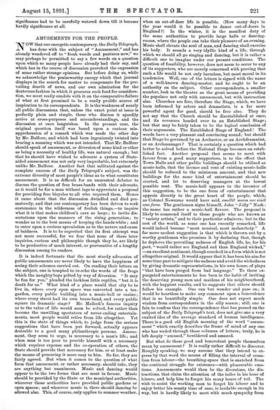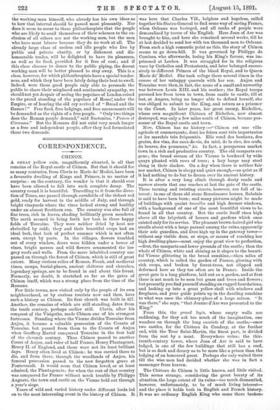AMUSEMENTS FOR THE PEOPLE.
NOW that our energetic contemporary, the Daily Telegraph, has done with the subject of "Amusement," and has -already wandered off to "fresh woods and pastures new," we may perhaps be permitted to say a few words on a question upon which so many people have already had their say, and which has in the course of discussion provoked the expression of some rather strange opinions. But before doing so, while we acknowledge the praiseworthy energy which that journal displays in the search for matter to compensate for the pre- vailing dearth of news, and our own admiration for the dexterous fashion in which it procures such food for considera- lion, we must really condole with it on the comparative failure of what at first promised to be a really prolific source of inspiration to its correspondents. It is the weakness of nearly all public discussions that, unless the exact point at issue is perfectly plain and simple, those who discuss it speedily -arrive at cross-purposes and misunderstandings, and the discussion at once languishes. In the present case, the original question itself was based upon a curious mis- apprehension of a remark which was made the other day by Mr. Balfour, and which had been ingeniously twisted into bearing a meaning which was not intended. That Mr. Balfour should speak of amusement, or diversion of some kind or other as being a necessity of healthy life, was natural enough ; but that he should have wished to advocate a system of State- aided amusement was not only very improbable, but extremely unlike Mr. Balfour. Another fact that militated against the complete success of the Daily Telegraph's subject, was the -extreme diversity of most people's ideas as to what constitutes amusement. It is as difficult for an unmusical debater to discuss the question of free brass-bands with their advocate, as it would be for a man without legs to appreciate a proposal for providing free bicycles to all who required them. Hence it came about that the discussion dwindled and died pre- maturely, and that our contemporary has been driven to seek sustenance in the wilderness of foolish things,—to inquire what it is that makes children's ears so large ; to invite dis- sertations upon the manners of the rising generation; to -wonder as to the best means of keeping the hands white ; and to enter upon a curious speculation as to the nature and cause of baldness. It is to be regretted that its first attempt was not more successful, for we fear that none of these later -inquiries, carious and philosophic though they be, are likely to be productive of much interest, or provocative of a lengthy -discussion among its readers.
It is indeed fortunate that the most sturdy advocates of public amusements are never likely to have the happiness of seeing their schemes carried out. On reading their letters on the subject, one is tempted to re-echo the words of the frogs which the naughty boys pelted by way of diversion. "It may be fan for you," pleaded the luckless little reptiles, "but it is death for us." What kind of a place would that city be to live in, where every open space was converted into a tea- garden, every public building into a music-hall or casino ; where every street had its own brass-band, and every public square its dramatic stage ? Mr. Mallock's famous inquiry as to the value of life would soon be solved, for rather than become the unwilling spectators of never-ending entertain- ments, most people would retire from life altogether. Yet this is the state of things which, to judge from the serious suggestions that have been put forward, actually appears desirable to a good many philanthropic persons. Amuse- ment, they seem to urge, is necessary to a man's life; and when man is too poor to provide himself with a necessary which requires expense and the co-operation of others, the state should provide that necessary for him, or at least make the means of procuring it more easy to him. So far, they are fairly agreed. But when it comes to the question of what form that amusement, or rather necessary, should take, they are anything but unanimous. Music and dancing would appear to be the two forms that are most in favour. Music should be provided by the State or the municipal authorities, wherever those authorities have provided public gardens or open spaces ; and wherever music is, there should dancing be allowed also. This, of course, only applies to summer weather,
when an out-of-door life is possible. (How many days in the year would it be possible to dance out-of-doors in England ?) In the winter, it is the manifest duty of the same authorities to provide large halls or dancing- rooms, where the people can take their pleasure of an evening. Music shall elevate the soul of man, and dancing shall exercise his body. It sounds a very idyllic kind of a life, through which we should all go singing and dancing, but it is rather a difficult one to imagine under our present conditions. The question of feasibility, however, does not seem to occur to any of its supporters, who are merely concerned with proving that such a life would be not only harmless, but most moral in its tendencies. Well, one of the letters is signed with the name of a well-known dancing-master, and he ought to be an authority on the subject. Other correspondents, a smaller number, look to the theatre as the great means of providing the populace not only with amusement, but with instruction also. Churches are free, therefore the Stage, which, we have been informed by actors and dramatists, is a far more powerful agent for good, should be free also. They do not say that the Church should be disestablished at once, and its revenues handed over to an Established Stage; but that may be fairly taken to be the logical conclusion of their arguments. The Established Stage of England ! The words have a very pleasant and convincing sound; but should that Stage be governed by an Archactor, or an Archdramatist, or an Archmanager ? That is certainly a question which had better be solved before the National Stage becomes an estab- lished fact. Another proposal that seems to meet with favour from a good many supporters, is to the effect that Town Halls and other public buildings should be utilised as music-halls, that the licence and rent of existing music-halls should be reduced to the minimum amount, and that new buildings for the same kind of entertainment should be erected, and let to deserving managers at the lowest possible rent. The music-hall appears to the inventor of this suggestion, to be the one form of entertainment that appeals directly to the great heart of the people, which, as Colonel Newcome would have said, emollit mores nee sinit ease feros. The gentleman signs himself, John " Jolly " Nash : the name has rather a music-hall flavour. The proposal is likely to commend itself to those people who are known as "variety artists," and to their particular admirers; but to the rest of the world, as some one has recently remarked, life would indeed become "most musical, most melancholy." A far more modest suggestion is that which is thrown out by a worthy gentleman who premises it by declaring that, though he deplores the prevailing sadness of English life, he, for his part, "would rather see England sad than England wicked," —an excellent sentiment, though couched in a form which is not altogether original. It would appear that it has been his aim for some time past to mitigate the sadness and avoid the wickedness by giving dramatic representations, in his own house, of plays "that have been purged from bad language." To these ex- purgated entertainments he has been in the habit of inviting the deserving young men and maidens of his neighbourhood, with the happiest results, and he suggests that others should follow his example. One can but wonder and pass on; it would be heartless to make any comment upon a benevolence that is so beautifully simple. One does not expect much wisdom from correspondents in the silly season ; still, one is fain to confess that the correspondence that has passed on the subject of the Daily Telegraph's text, does not give one a very exalted idea of the average standard of human intelligence. There is a good old English meaning of the word " amuse- ment " which exactly describes the frame of mind of any one who has waded through those columns of letters ; truly, he is left deeply "amused," bewildered and amazed.
But what do these good and benevolent people themselves mean by amusement ? It is really rather difficult to discover. Roughly speaking, we may assume that they intend to ex- press by that word the means of filling the interval of cessa- tion from labour—the breathing-space that is snatched from the continual struggle for existence—with pleasurable emo- tions. Amusements would then be the diversions, the dis- tractions, that claim the attention of the toiler in his hour of leisure, and help him to forget his many hours of toil. The
wish to assist the working man to forget his labour and to enjoy better his scanty time of ease, is laudable enough in its way, but is hardly likely to meet with much sympathy from
the working man himself, who already has his own ideas as to how that interval should be passed most pleasantly. Nor does it seem to occur to these philanthropists that the people who are likely to avail themselves of their schemes to the ex- clusion of all others are not the working men, but the men who have most leisure because they do no work at all. The already large class of useless and idle people who live by public and private charity, or by dishonest and dis- honourable trades, will be delighted to have its pleasures, as well as its food, provided for it free of cost ; and if this class chooses to dance to the public piping, the decent working man will be better pleased to stay away. This is a class, however, for which philanthropists have a special tender- ness, and which they have been lately doing their best to swell. Indeed, were these good people only able to persuade the public to share their misplaced and sentimental sympathy, we should not yet despair of seeing the populace of London raised to the proud standing of the populace of Rome; under the Empire, or of hearing the old cry revived of "Bread and the Games !" Free food, free lodgings, and free amusements will be demanded as the rights of a free people. "Only two things does the Roman people demand," said Suetonius, "Panen et Circenses." But the Romans did not exist very much longer as a free and independent people, after they had formulated those two demands.



































 Previous page
Previous page